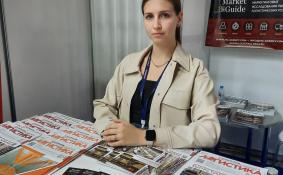
научно-практический
журнал

Новости редакции
Дорогие читатели! Представляем вашему вниманию заключительный номер журнала «ЛОГИСТИКА» в 2024 г. Мы постарались сделать его насыщенным и интересным.
Дорогие читатели! Представляем вашему вниманию 11-й номер журнала «ЛОГИСТИКА», где вы найдете актуальные материалы и статьи.
28 ноября в Москве в отеле «Золотое кольцо» прошел XI форум «Склады России: итоги года!».
Статья недели:

ФОТО НЕДЕЛИ
ЦИТАТЫ
События в российской логистике
CeMAT – Special dedicated display area for cranes and lifting equipment
– Cranes & Lifting Equipment Pavilion puts digitalization center stage
Hannover, Germany. Ergonomics and digitalization are the defining features of the workplace in production and logistics. The manufacturers of cranes and crane systems have to adjust to the challenges of the new working environment, and at the upcoming CeMAT will be showcasing their latest products in the newly designed special display area “Cranes & Lifting Equipment Pavilion” in Hall 27. “We’ve provided an excellent platform here for the industry to present their achievements in a dynamic environment. Manufacturers of cranes and lifting equipment will be demonstrating their own strengths, and showing visitors how their products can be integrated into tomorrow’s fully networked and automated logistics chains”, says Wolfgang Pech, Senior Vice-President at Deutsche Messe.
Intelligent systems solutions are in demand
“As in many other sectors, the trend in the crane industry is very much towards intelligent systems and everything we mean by the term Industry 4.0”, explains Thomas Kraus, Support Center Director for Stahl CraneSystems GmbH in Künzelsau (Baden-Württemberg). “The integration of individual process operations into a single operating package is a development that is being embraced by more and more crane manufacturers.” Controlling crane systems via a tablet or other smart gadgets, collecting and analyzing process data – these things, he predicts, will be standard practice in the industry before long.
This view is also shared by Wilfried Neuhaus-Galladé, managing member of the VDMA’s Association for Materials Handling and Intralogistics, as well as managing director of the Witten-based supplier of lifting equipment J.D.Neuhaus. “To get the full benefit of the new technology, our businesses will have to master many challenges”, says Neuhaus-Galladé. “For many companies, the main hurdles are high investment costs and a not very clear idea of the benefits that will result.” IT security concerns are still deterring many decision-makers, as is the absence of definitive technical standards. But he insists that the crane industry must, and will, meet this challenge. Beyond that, he is sure that customer-specific solutions will figure more prominently in the future – both in terms of the engineering and the complexity of the systems. And that means more extensive documentation as well. The more complex the system, the more important the quality of the after-sales service provided by the manufacturer in order to ensure trouble-free production under 24/7 operating conditions.
Materials handling systems show the way ahead
Needless to say, his own company J.D. Neuhaus is also getting to grips with Industry 4.0. “As our core business is compressed air as a power source, the challenge for us is to develop electro-pneumatic control systems that make our products compatible with digitalization”, says Neuhaus-Galladé. “But given the punishing conditions under which our lifting equipment and cranes generally operate, this issue tends not to feature very prominently.” In this connection he is keen to point out that J.D. Neuhaus successfully developed an application in the mid-1990s that allowed several hoist units to communicate with each other – long before anybody even thought of Industry 4.0. “I’m sure other manufacturers of cranes and hoists could cite similar examples”, says Neuhaus-Galladé. “This just goes to show that materials handling systems have always led the way on many different fronts.”
Demographic change is also a factor
“Against a background of demographic change we need to give serious thought to ways of reducing the workload for staff, so that we can increase their productivity over the long term”, says Marc Rieser, managing director of Vetter Krantechnik GmbH, based in Siegen. “In future we will see more demand from customers for individual solutions tailored to their specific needs, combined with short delivery times.” He agrees that Industry 4.0 is becoming increasingly important for the crane engineering sector. “For example, we can now incorporate preventive maintenance modules, which can increase plant availability and reduce downtime for repairs and maintenance.”



















